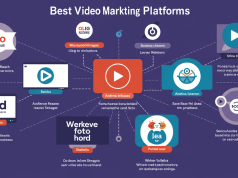Video marketing has exploded into one of the most powerful tools for businesses to connect with their audiences. With over 3 billion hours of video watched on YouTube every month, and video content generating 1,200% more shares than text and images combined, it’s clear that video isn’t just a trend—it’s essential for modern marketing success.
But creating videos that actually convert requires more than just hitting record. The most successful video marketing campaigns share specific strategies and techniques that separate them from the countless hours of content uploaded every day. This comprehensive guide will walk you through proven video marketing tips that drive real business results, backed by examples from brands that have mastered the art of video storytelling.
Master the Art of the Strong Opening Hook
The first 3-5 seconds of your video determine whether viewers will continue watching or scroll away. Successful video marketing examples consistently demonstrate the power of compelling opening hooks that immediately grab attention.
Create Curiosity with Questions
Starting your video with an intriguing question taps into viewers’ natural curiosity. Dollar Shave Club’s viral video opened with “Hi, I’m Mike, and I have a question for you: Why do guys pay so much for razors?” This simple question hook helped generate over 24 million views and transformed their business.
Present Surprising Statistics
Open with unexpected data that challenges assumptions or reveals surprising truths. For example, you might start with “93% of businesses that use video marketing say it’s improved their ROI—but most are making one critical mistake.”
Show the Transformation First
Lead with the end result before explaining how you got there. Fitness brands excel at this by showing dramatic before-and-after transformations in the first few seconds, then explaining the process.
Pattern Interrupts for Social Media
On platforms like TikTok and Instagram, create visual or audio pattern interrupts that stop the scroll. This could be unexpected movements, bold text overlays, or surprising sound effects that break through the noise.
Focus on Value-First Content Strategy
The most successful video marketing examples prioritize providing value over direct selling. HubSpot Academy’s tutorial videos demonstrate this perfectly—they focus on solving specific marketing challenges rather than directly promoting their software, yet they’ve built massive brand authority and generated countless leads.
Educational Content That Builds Trust
Create videos that teach your audience something valuable. This positions your brand as an industry authority while subtly demonstrating your expertise. Educational videos work particularly well for B2B companies and service-based businesses.
Problem-Solution Framework
Structure your videos around specific problems your audience faces. Start by acknowledging the challenge, then walk through your solution step by step. This approach works for everything from product demonstrations to thought leadership content.
Actionable Takeaways
Every video should give viewers something they can implement immediately. This could be a specific technique, a tool recommendation, or a step-by-step process. Actionable content increases engagement and encourages sharing.
Leverage Authentic Storytelling
Authenticity resonates more than polished corporate messaging. Airbnb’s “Belong Anywhere” campaign succeeds because it features real hosts and travelers sharing genuine experiences rather than scripted testimonials.
Customer Success Stories
Showcase real customers explaining how your product or service transformed their business or life. Slack’s customer testimonial series works because they focus on specific metrics and results rather than generic praise. Include diverse customer representation across different industries to appeal to various audience segments.
Behind-the-Scenes Content
Pull back the curtain on your business processes, company culture, or product development. Patagonia’s behind-the-scenes environmental mission videos build brand loyalty by showcasing their authentic commitment to sustainability values.
User-Generated Content Integration
Encourage customers to create content featuring your products. Glossier built their entire brand strategy around featuring real customers using their products, creating authentic social proof that influences purchasing decisions.
Optimize for Each Platform
Different platforms require different approaches. A video that performs well on YouTube might fail on TikTok due to format, length, or style differences.
YouTube Optimization Tips
YouTube favors longer-form content that keeps viewers engaged. Focus on watch time and completion rates by creating compelling narratives that maintain interest throughout. Use clear titles with relevant keywords, detailed descriptions, and custom thumbnails that stand out in search results.
Short-Form Platform Strategies
TikTok, Instagram Reels, and YouTube Shorts require quick, engaging content that delivers value immediately. Ocean Spray’s viral TikTok moment succeeded because the company responded quickly to the opportunity while maintaining authenticity.
LinkedIn Video Best Practices
Professional platforms like LinkedIn favor educational and thought leadership content. Share industry insights, company updates, and professional tips that provide value to your business network.
Instagram Story Techniques
Use Instagram Stories for behind-the-scenes content, quick tips, and interactive elements like polls and Q&As. Stories disappear after 24 hours, making them perfect for timely, casual content.
Perfect Your Product Demonstrations
Product demonstration videos can significantly impact purchasing decisions when done effectively. Apple’s iPhone launch videos set the standard by focusing on benefits rather than specifications, using beautiful visuals and clear explanations.
Benefit-Focused Messaging
Explain how features improve users’ lives rather than just listing technical specifications. Dyson’s engineering explanation videos justify premium pricing by showing how innovation solves real problems.
Real-World Context
Show your product being used in realistic situations. Demonstrate how it fits into customers’ daily routines or solves specific challenges they face.
Comparison Videos
Create honest comparisons between your product and competitors, or between different versions of your product. This helps viewers make informed decisions and builds trust through transparency.
Implement Interactive and Live Content
Interactive video content creates personal connections that strengthen customer relationships. Sephora’s virtual makeup tutorials allow viewers to ask questions and receive personalized advice, building relationships while demonstrating products.
Live Video Benefits

Live streaming creates urgency and authenticity that pre-recorded content can’t match. Use live video for product launches, Q&A sessions, tutorials, and behind-the-scenes content.
Interactive Elements
Incorporate polls, questions, and calls-to-action throughout your videos. This increases engagement and provides valuable feedback about your audience’s preferences and needs.
Community Building
Use video to build communities around your brand. Nike’s live training sessions provide value while showcasing products in action, creating shared experiences that strengthen brand loyalty.
Measure and Optimize Performance
Successful video marketing requires continuous measurement and optimization. Focus on metrics that align with your business goals rather than vanity metrics like views alone.
Key Performance Indicators
Track engagement quality metrics like comment sentiment, share rates, and watch time. Monitor conversion tracking including website traffic from video content, lead generation, and sales attribution. Measure brand awareness indicators such as branded search volume increases and brand mention frequency.
Analytics Tools
Use platform-specific analytics to understand performance patterns. YouTube Analytics helps optimize for search, while Facebook Insights reveal engagement patterns. Implement cross-platform tracking with Google Analytics and UTM parameters for comprehensive campaign attribution.
A/B Testing
Test different video elements including thumbnails, titles, opening hooks, and calls-to-action. Small changes can significantly impact performance, so systematic testing helps identify what resonates with your audience.
Technical Excellence Matters
While content is king, technical quality significantly impacts viewer perception and engagement. Poor audio quality or shaky footage can undermine even the best content.
Audio Quality Priority
Invest in good microphones and audio equipment. Viewers will tolerate lower video quality more readily than poor audio. Consider professional voiceovers for important marketing videos.
Mobile Optimization
With over 75% of video content consumed on mobile devices, ensure your videos look and sound great on smartphones. This includes readable text sizes, clear visuals, and mobile-friendly aspect ratios.
Accessibility Features
Add captions to all videos for accessibility and to accommodate viewers who watch without sound. Many social media platforms favor videos with captions, potentially increasing your reach.
Create Compelling Calls-to-Action
The best video marketing examples seamlessly integrate calls-to-action throughout the content without being pushy. Strategic CTA placement can significantly impact conversion rates.
Multiple Touchpoints
Include calls-to-action at multiple points throughout longer videos. This accommodates viewers who might leave at different times while maintaining engagement for those who watch completely.
Platform-Specific Actions
Optimize CTAs for each platform’s capabilities. YouTube videos can link to websites, while Instagram videos should direct viewers to your bio link or encourage story interactions.
Clear Next Steps
Make it obvious what viewers should do next. Whether it’s visiting your website, subscribing to your channel, or downloading a resource, remove any friction from the conversion process.
Build Long-Term Video Marketing Success
Successful video marketing isn’t about creating one viral video—it’s about building a sustainable content strategy that consistently delivers value to your audience.
Content Calendar Planning
Develop a content calendar that balances different video types including educational content, product demonstrations, customer stories, and behind-the-scenes footage. Consistency builds audience expectations and loyalty.
Brand Voice Consistency
Maintain consistent brand voice and visual style across all videos. This builds recognition and trust over time, making your content instantly recognizable to your audience.
Continuous Learning
Stay updated with platform changes, new features, and emerging trends. Video marketing evolves rapidly, and successful marketers adapt their strategies accordingly.
Transform Your Video Marketing Strategy
These video marketing tips provide a foundation for creating content that drives real business results. Success comes from understanding your audience’s needs, providing genuine value, and maintaining authentic brand voice throughout your video content.
Start by identifying which strategies align most closely with your brand goals and audience preferences. Focus on one or two techniques initially, master them, then expand your video marketing toolkit. Remember that the most successful video marketing examples share common elements: strong opening hooks, value-first content, authentic storytelling, and strategic optimization for each platform.
The brands that win with video marketing are those that consistently provide value, maintain authenticity, and adapt their strategies based on performance data. By implementing these proven techniques and continuously refining your approach, you’ll create video content that not only engages your audience but drives measurable business growth.









